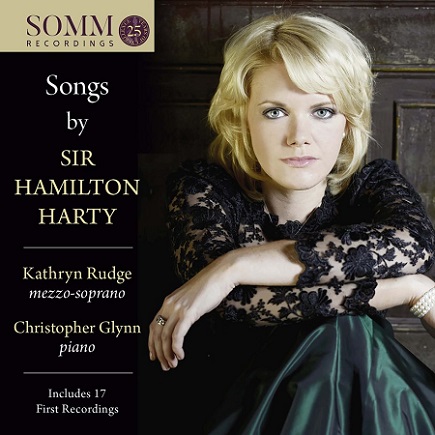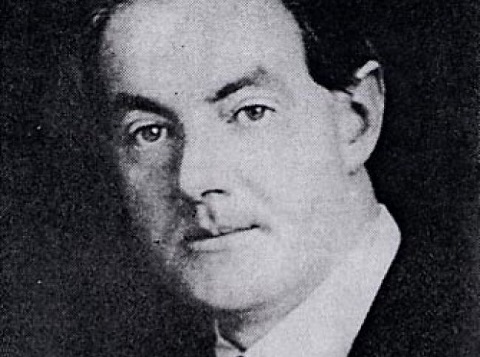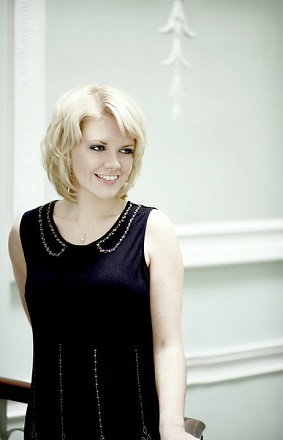
14 Aug 2020
Songs by Sir Hamilton Harty: Kathryn Rudge and Christopher Glynn
‘Hamilton Harty is Irish to the core, but he is not a musical nationalist.’
The Sixteen continues its exploration of Henry Purcell’s Welcome Songs for Charles II. As with Robert King’s pioneering Purcell series begun over thirty years ago for Hyperion, Harry Christophers is recording two Welcome Songs per disc.
In February this year, Albanian soprano Ermonela Jaho made a highly lauded debut recital at Wigmore Hall - a concert which both celebrated Opera Rara’s 50th anniversary and honoured the career of the Italian soprano Rosina Storchio (1872-1945), the star of verismo who created the title roles in Leoncavallo’s La bohème and Zazà, Mascagni’s Lodoletta and Puccini’s Madama Butterfly.
Collapsology. Or, perhaps we should use the French word ‘Collapsologie’ because this is a transdisciplinary idea pretty much advocated by a series of French theorists - and apparently, mostly French theorists. It in essence focuses on the imminent collapse of modern society and all its layers - a series of escalating crises on a global scale: environmental, economic, geopolitical, governmental; the list is extensive.
Amongst an avalanche of new Mahler recordings appearing at the moment (Das Lied von der Erde seems to be the most favoured, with three) this 1991 Mahler Second from the 2nd Kassel MahlerFest is one of the more interesting releases.
If there is one myth, it seems believed by some people today, that probably needs shattering it is that post-war recordings or performances of Wagner operas were always of exceptional quality. This 1949 Hamburg Tristan und Isolde is one of those recordings - though quite who is to blame for its many problems takes quite some unearthing.
The voices of six women composers are celebrated by baritone Jeremy Huw Williams and soprano Yunah Lee on this characteristically ambitious and valuable release by Lontano Records Ltd (Lorelt).
As Paul Spicer, conductor of the Royal Birmingham Conservatoire Chamber Choir, observes, the worship of the Blessed Virgin Mary is as ‘old as Christianity itself’, and programmes devoted to settings of texts which venerate the Virgin Mary are commonplace.
Ethel Smyth’s last large-scale work, written in 1930 by the then 72-year-old composer who was increasingly afflicted and depressed by her worsening deafness, was The Prison – a ‘symphony’ for soprano and bass-baritone soloists, chorus and orchestra.
‘Hamilton Harty is Irish to the core, but he is not a musical nationalist.’
‘After silence, that which comes closest to expressing the inexpressible is music.’ Aldous Huxley’s words have inspired VOCES8’s new disc, After Silence, a ‘double album in four chapters’ which marks the ensemble’s 15th anniversary.
A song-cycle is a narrative, a journey, not necessarily literal or linear, but one which carries performer and listener through time and across an emotional terrain. Through complement and contrast, poetry and music crystallise diverse sentiments and somehow cohere variability into an aesthetic unity.
One of the nicest things about being lucky enough to enjoy opera, music and theatre, week in week out, in London’s fringe theatres, music conservatoires, and international concert halls and opera houses, is the opportunity to encounter striking performances by young talented musicians and then watch with pleasure as they fulfil those sparks of promise.
“It’s forbidden, and where’s the art in that?”
Dublin-born John F. Larchet (1884-1967) might well be described as the father of post-Independence Irish music, given the immense influenced that he had upon Irish musical life during the first half of the 20th century - as a composer, musician, administrator and teacher.
The English Civil War is raging. The daughter of a Puritan aristocrat has fallen in love with the son of a Royalist supporter of the House of Stuart. Will love triumph over political expediency and religious dogma?
Beethoven Symphony no 9 (the Choral Symphony) in D minor, Op. 125, and the Choral Fantasy in C minor, Op. 80 with soloist Kristian Bezuidenhout, Pablo Heras-Casado conducting the Freiburger Barockorchester, new from Harmonia Mundi.
A Louise Brooks look-a-like, in bobbed black wig and floor-sweeping leather trench-coat, cheeks purple-rouged and eyes shadowed in black, Barbara Hannigan issues taut gestures which elicit fire-cracker punch from the Mahler Chamber Orchestra.
‘Signor Piatti in a fantasia on themes from Beatrice di Tenda had also his triumph. Difficulties, declared to be insuperable, were vanquished by him with consummate skill and precision. He certainly is amazing, his tone magnificent, and his style excellent. His resources appear to be inexhaustible; and altogether for variety, it is the greatest specimen of violoncello playing that has been heard in this country.’
Baritone Roderick Williams seems to have been a pretty constant ‘companion’, on my laptop screen and through my stereo speakers, during the past few ‘lock-down’ months.
Melodramas can be a difficult genre for composers. Before Richard Strauss’s Enoch Arden the concept of the melodrama was its compact size – Weber’s Wolf’s Glen scene in Der Freischütz, Georg Benda’s Ariadne auf Naxos and Medea or even Leonore’s grave scene in Beethoven’s Fidelio.

‘Hamilton Harty is Irish to the core, but he is not a musical nationalist.’
So stated the Musical Times on 1st April 1920, in an article about the autodidact pianist-conductor-composer, upon his appointment as Conductor of the Hallé Orchestra.
This immensely enjoyable disc of Harty’s songs, performed by mezzo-soprano Kathryn Rudge and pianist Christopher Glynn, confirms MT’s opinion. The 23 songs presented (there are also two short compositions for piano solo) range from accompanied folk-song, through simple parlour song, to more complex art song, and while the music is characterised by several elements identifiable with Irish music - melodic ornamentation, modal harmony and inflection, pentatonicism - Harty’s musical ‘nationalism’ is assimilated within the Anglo-European musical language of his day.
One is reminded of the views of Harty’s teacher and mentor, Michele Esposito - expressed during an interview with actor-playwright, James Cousins, for the Irish Independent in February 1906 - who warned against the ‘merely naïve and crude’ use of Irish folk-song, encouraging Irish composers to ‘master their art as musicians to the fullest possible extent: then, go back to the wonderful store of folk-melodies and build them into their music.’ [1]
The author of the aforementioned Musical Times article also confidently declared, ‘What all the world knows about Mr Harty is that he is the prince of accompanists; that he is Irish and that he is a composer; that his wife is Miss Agnes Nicholls.’ Perhaps that assumption was true in 1920, but nowadays Harty’s repute is founded primarily upon his conducting career, specifically his long association with the Hallé Orchestra, London Symphony Orchestra, and other significant classical organisations. Yet, he composed over 60 songs, and it is good to hear a diverse range of them here, including sixteen first recordings.
 Hamilton Harty. Photo credit: David Greer.
Hamilton Harty. Photo credit: David Greer.
Harty’s interest in the song form was most likely encouraged both by his activities as an esteemed accompanist, and by his marriage to the acclaimed soprano Agnes Nicholls in 1904, for whom many of the songs were probably composed. In Harty’s autobiography she remembers an early meeting:
‘At that time I had no idea he composed, until one day he brought a song and very shyly handed it to me. It was ‘The Song of Glen Dun’. I thought it lovely and put it into my programmes whenever the opportunity occurred. Shortly after he dedicated a song called ‘Rose Madness’ to me.’
‘The Song of Glen Dun’ was Harty’s first published song in 1902 and sets a poem by the Irish writer Moira O’Neill. Harty retains the strophic form, enlarging the accompaniment texturally and harmonically with each verse, but Christopher Glynn keeps the sometimes lavish gestures light so that Kathryn Rudge is never forced to exert undue strength to ride the piano’s crests, and her mezzo-soprano sustains a sweet innocence while not lacking emotional nuance. Her diction is immaculate, here and through the disc.
Harty was himself a frequent contributor to the Musical Times, and in an article of April 1924 titled ‘Modern Composers and Modern Composition’ he set out four ‘laws’ by which music should be governed, the second of which was ‘Melody must be the first reason for [music’s] existence.’ The opening song here confirms that Harty put theory into practice. Again setting text by O’Neill (a poem which had also been set by Stanford), ‘Sea Wrack’ is a sort of hybrid parlour-art song: the vocal part is fairly straightforward while the pictorial accompaniment makes more virtuosic demands. O’Neill exploits the linguistic pun ‘wrack’/’wreck’ - the former being both a type of seaweed and an archaic Irish word for a shipwreck - as she tells a tragic tale of the gathering of sea wrack in small boats.
In Glynn’s sure hands the musical pictorialisms unfold naturally, from the gentle wave motions of the opening, through the tremolo exertions as the seaweed hunters struggle to lift their catch into the boat, and on to the rolling flood of stormy septuplet surges. Rudge relates the tragedy with the poise and presence of a born storyteller. The tale unfolds gradually, there is no melodrama; the calm account suddenly swells with alarm, as Rudge further enriches her always fertile tone, and the harmony shifts to the oddly bright A major, “There’ [sic] a boat gone down upon the Moyle”. The duo’s structuring of a simple strophic into a tragedy of great magnitude is skilful.
Harty set nine of O’Neill’s poems, and we also hear ‘By the Sea’, completed in January 1909 but left unpublished; Dibble relates that Harty explained that it was ‘Written for some private person. Whose name I have forgotten.’ Rudge makes much of the song’s melodic directness and Glynn’s gentle commentary adds a touch of wistfulness; this is a lovely, sincere rendition of a simple but eloquent song.
In choosing to set contemporary Irish poets such as Pádraic Colum, Elizabeth Shane, P.W. Joyce, Katherine Tynan and Alice Milligan, Harty was supporting the Irish Literary Revival. Six Songs of Ireland (1908) included - alongside settings of three more O’Neill poems - ‘Dreaming’ (Cahir Healy), ‘A Lullaby’ (Cahal O’Byrne) and ‘Flame in the Skies of Sunset’ (Lizzie Twigg).
 Christopher Glynn. Photo credit: Gerard Collett.
Christopher Glynn. Photo credit: Gerard Collett.
The dark-hued ‘A Lullaby’ is far more sophisticated than a ‘conventional’ hush song, and Rudge and Glynn effectively balance the characteristic repetitions and rocking fluidity with Harty’s idiosyncratic flourishes and asymmetries: the evolving phrases are effectively shaped, melodic duplets intruding on but not unsettling the triplet pulse and the piano’s ornaments slithering delicately, intimating the poetic imagery of fairy dells, silvery rings, rose-strewn strands and glistening dew. Both piano and voice incorporate surprising chromatic unwindings, and there’s a strange harmonic twist with the mother’s assurance “I’ll make you a nest, a soft, warm nest”. Such chromaticism is increasingly insistent in ‘Dreaming,’ in which the protagonist laments lost love and longs for death. Rudge conveys mystery in her lower voice - as the protagonist is questioned, “What are you watching?”, “What are you hearing?” - contrasting this with the shining replies, “Wisps o’white dreams”, “Wee weans a-crying”. Glynn’s chromatic complexities both reflect and deepen the anguish of the acknowledgement that “lovers and dreamers and joys all agone”. Through the dusky branches, “Gleameth the rosy flush”, observes the poet in ‘Flame in the Skies of Sunset’, a phrase which might equally describe Rudge’s lovely sweetness in this song.
‘A Lullaby’ and ‘Dreaming’ had been published in O’Byrne’s and Healy’s co-edition, Lane o’ the Thrushes, and Harty also set the title song. Glynn’s trembling oscillations and fluttering trills evoke the “shimmering shafts of light” and “whirring of wings”, while a low chromatic rumble hints at the “deeper silence, a swift brown stream unseen”, as Rudge paints a picture of this vibrant landscape with easy naturalism. The selection of songs are unified by prevailing elements of Harty’s language and by recurring poetic themes and ideas, but are also diverse in expanse and mood: Pádraic Colum’s ‘O men from the fields’ inspires a brief ‘Cradle Song’ which Rudge and Glynn make tenderly haunting, while Emily Lawless’s ‘The Stranger Grave’ - which depicts the grave of an unknown drowned man in Inis Meáin, framing the image of a blue-footed woman who pitter-patters across the grave with another of the graves of unbaptised babies excluded from the churchyard - prompts a more sophisticated response from Harty. Glynn’s chorale-like opening establishes a sombre mood, and Rudge’s clear, even tone enthrals the ear as the melancholy poem unfolds. The piano drives forward before being suddenly halted by the speaker’s troubled question, “What strange fate brought you to so strange a shrine?” The duo capture the song’s agitation and restlessness, while never overexaggerating Harty’s immensely detailed, varied writing. This is one of the highpoints of the disc.
 Kathryn Rudge. Photo credit: Sussie Ahlburg.
Kathryn Rudge. Photo credit: Sussie Ahlburg.
Some of Harty’s late songs are included too. In the 1930s he was forced to abandon conducting following an operation for a brain tumour, and he returned to composition. From the 1938 Five Irish Poems, ‘At Easter’ (Helen Lanyon) again showcases the evenness of Rudge’s mezzo, as well as the reverent quality she finds in its lower reaches - both elements perfectly suited to the intimacy of an Easter service, while a sole bird sings rapturously in the churchyard beyond. Glynn and Rudge show how feelings of great magnitude can be conveyed by quiet gestures. ‘The Fiddler of Dooney’ (W.B. Yeats) is a more light-hearted ditty, and Glynn trips easily through the mischievous piano part, ever lucid and light as Rudge gradually warms and enlarges her account of the protagonist’s hypnotic dance-inducing fiddling.
The duo also offer some settings of folksongs such as were collected and published by Gaelic revivalists. The melodies ‘My Lagan Love’ and ‘The Blue Hills of Antrim’ both have texts by Seosamh MacCathmhaoil (Joseph Campbell), and were published in Songs of Uldah in 1904 with accompaniments by Herbert Hughes. Harty’s setting of the former fills out the accompaniment with harp-like arpeggiation which Glynn renders with a sense of freedom and openness; Rudge demonstrates confident appreciation of sean-nós, ‘old custom’, shaping the vocal line with rhythmic flexibility within a steady pulse, and ornamenting with judicious acciaccaturas and mordents. The melody lies low and she finds a lovely rich huskiness at times, her mezzo seeming to shimmer with emotion. ‘The Lowlands of Holland’ was published in Harty’s 1929 Three Irish Folksongs and is a more vigorous strophic tale, told by a bereaved mother to her daughter, about the departure of her husband, on their wedding night, to fight with the Highlanders against the Dutch. As always on this recording, despite the rough stamp of the accompaniment and the mother’s increasingly fervent declarations of loyalty, Glynn and Rudge prioritise storytelling over melodrama.
Alongside these Irish settings, Harty also set many poems by English, Scottish and American poets. Riccardo Stephens was a Cornish physician, poet and occultist and in his ‘Scythe Song’ we hear the whooshing back-and-forth motion of the scythe in the piano’s soft ripples; there’s a soothing softness in Rudge’s voice as she rejoices, “This is the sound … of summer days […] Tis sweet, sweet to live.” Lettice B. Hay Shaw died in 1904 at the age of just seventeen, but she left an impressive body of writings. In 1906 Harty published his Three Flower Songs, of which Glynn and Rudge perform two: by simple means in ‘Poppies’ the duo convey the oscillation between remembered passion and present grief, while the beautiful lyricism of ‘Mignonette’ is tinged with both elegy and impassioned conviction.
Nicholls was an esteemed Wagnerian and ‘To the Gods of Harbour and Headland’ (which sets text from J.W. Mackail’s Select Epigrams from the Greek Anthology (1906) and is one of Harty’s Three Sea Prayers) was written for the soprano to perform in the Bechstein Hall in November 1909. In two and a half minutes it makes many demands on both piano and voice, but the performers negotiate the unpredictable and restless material assuredly, and Rudge has the power to rise to the vocal climaxes without strain. The steadier progress of the Whitman setting, ‘By the Bivouac’s Fitful Flame’, is stately and profound. At the end of the disc, Rudge and Glynn take us back to the seventeenth century: ‘Come, O come, My Life’s Delight’ (Thomas Campion) is a rush of effervescent joy, while ‘Sweet Amaryllis’ (attr. Dowland) has an archaic poise and dignity.
The various personal threads relating to Harty which bind the songs enhance their potency. ‘Your Hand in Mine’ (Harold Simpson) was written for Nicholls to perform at one of Chappell’s Ballad Concerts, and it flows with feeling, rapturous and confident. By contrast, ‘My Thoughts of You’, the text of which is attributed to Harty himself, acquires a tender poignancy when we know that his marriage to Nicholls took unhappy turns. The shine of Rudge’s mezzo and the delicacy of the piano’s interjections seems to embody urgent but fragile hopes.
This disc will give much delight. Despite the apparent formal simplicity of many of the songs, Rudge and Glynn reveal their depth and diversity.
Claire Seymour
[1] Jeremy Dibble, Hamilton Harty: Musical Polymath (Boydell, 2013), p.64. The contextual information presented in this review has been drawn from Dibble; David Greer, Hamilton Harty: his Life and Music (Blackstaff Press, 1979); and Hamilton Harty, Early Memories (ed. Greer) (John Aiken and Son Ltd, 1979).